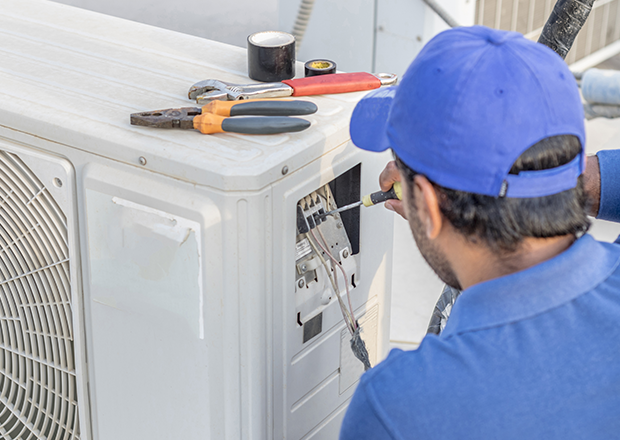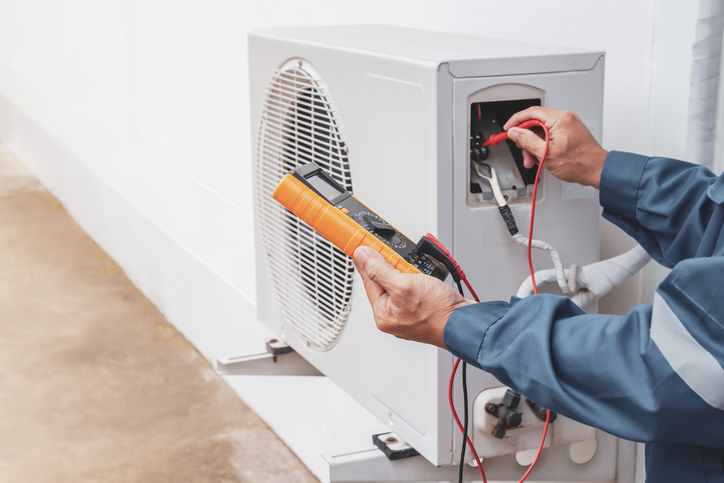All Regarding A/c: Identifying Common Issues and Effective Air Conditioner Fixing Techniques
Heating and cooling systems are essential for keeping interior comfort. Understanding their components and functionality is essential for recognizing common concerns. House owners commonly deal with problems such as inadequate cooling, strange odors, or increasing energy prices. These indications can indicate underlying concerns that might call for interest. Discovering do it yourself troubleshooting techniques can be valuable, however knowing when to seek specialist assistance is equally crucial. What steps can be required to guarantee durable performance?
Understanding Your HVAC System: Elements and Performance
A HVAC system, commonly considered the foundation of indoor climate control, includes a number of essential parts that collaborate to manage temperature and air high quality. The key elements consist of the heating device, ventilation system, and a/c unit. The heating system, typically a heating system or central heating boiler, creates warmth throughout chillier months, while the cooling system cools down indoor areas throughout the summer.

Common HVAC Problems House Owners Encounter
Property owners often encounter several usual cooling and heating issues, consisting of irregular temperature level distribution throughout their space. In addition, unusual noises throughout procedure can suggest underlying concerns that call for focus. Resolving these problems without delay is vital for keeping ideal system performance.
Irregular Temperature Level Circulation
Numerous homes experience the aggravating concern of inconsistent temperature distribution, where particular rooms feel uncomfortably cozy while others continue to be also cool. This issue often arises from a variety of factors, including poor insulation, blocked vents, or a poorly sized heating and cooling system. When air ducts are not appropriately secured or when furniture blocks air flow, some rooms may receive insufficient cooling. In addition, thermostat placement can greatly influence temperature regulation; a thermostat located in a sunlit location may misstate the total temperature of your house. Regular upkeep, including cleaning filters and guaranteeing ductwork is clear, can help ease these inconsistencies. Home owners may additionally think about zoning systems to better control temperature levels throughout various areas of the home, advertising a much more comfortable living environment.
Uncommon Sounds Throughout Procedure
When a heating and cooling system operates, unusual sounds can show underlying problems that need focus. Home owners might come across a variety of audios, such as grinding, squeaking, or hissing. Grinding noises frequently signal worn-out bearings or parts, while squealing can suggest loose belts or parts requiring lubrication. Hissing may indicate a refrigerant leak, which can endanger the system's efficiency. Additionally, banging audios could indicate loose ductwork or a concern with the blower fan. Each of these sounds works as a warning, triggering homeowners to investigate further. Neglecting these signs can result in more substantial issues and expensive repair work. Regular upkeep and punctual focus to uncommon noises can improve system durability and efficiency, making sure a comfortable living setting.
Signs That Indicate Your Air Conditioning Requirements Fixing
Just how can one tell if their cooling unit requires fixing? Numerous indications may suggest underlying concerns needing specialist attention. If the A/c falls short to cool the room properly, it might recommend a cooling agent leakage or compressor malfunction. Furthermore, a rise in energy costs without matching usage modifications might indicate ineffectiveness in the system. Property owners need to also look out to uncommon scents originating from the device, which can show mold and mildew growth or electrical concerns. If the A/c regularly cycles on and off, it could be a sign of a faulty thermostat or other mechanical issues. The visibility of water merging around the device can suggest a stopped up drainpipe line. Recognizing these indicators early can conserve money and time, ensuring that the air conditioning system runs effectively and efficiently.
Do It Yourself Troubleshooting Techniques for Heating And Cooling Issues
When dealing with cooling and heating concerns, house owners can utilize a number of DIY troubleshooting methods to recognize the trouble. Trick methods consist of checking thermostat settings, checking air filters, and reviewing water drainage issues. These steps can assist pinpoint common malfunctions before seeking professional assistance.
Inspecting Thermostat Settings
What actions should house owners take to guarantee their thermostat setups are appropriate? They must confirm the thermostat is established to the wanted temperature level and mode, whether home heating or air conditioning. Checking for a clear screen and verifying the thermostat is not set to "hold" or "trip" mode is essential. Homeowners should also validate that the thermostat is level and installed in a place without drafts, straight sunlight, or various other temperature influences. Furthermore, recalibrating the thermostat can assist offer accurate readings. If the thermostat operates on batteries, changing them might settle any kind of problems. By systematically reviewing these variables, house owners can often recognize and remedy thermostat-related issues, promoting optimal a/c system efficiency.
Inspecting Air Filters
Air filters play a crucial function in preserving suitable cooling and heating efficiency. They trap dust, irritants, and various other particles, making sure tidy air circulation. In time, filters can end up being blocked, lowering airflow and efficiency. To check air filters, people need to initially locate the filter, frequently view it discovered in the return air duct or near the heating system. As soon as situated, they need to evaluate the filter's condition-- if it appears dirty or discolored, it likely needs replacement. Many filters require changing every 1-3 months, relying on usage and environmental factors. Regular evaluation and timely replacement of air filters not only enhance air quality but also prolong the lifespan of HVAC systems, preventing potential breakdowns and pricey repair services.
Reviewing Drain Issues
Exactly how can home owners effectively recognize and deal with water drainage issues within their heating and cooling systems? Initially, they ought to check the condensate drain line for blockages or obstructions, which can cause water accumulation. House owners may use a wet/dry vacuum cleaner to remove any particles obstructing the line. Next off, examining the drain frying pan for corrosion or leaks is crucial, as a harmed pan can create water to overflow. Routine cleansing of the drain line with a combination of vinegar and visite site water assists avoid future obstructions. Furthermore, ensuring correct slope of the drainpipe line promotes reliable water flow. If these DIY techniques do not solve the issue, getting in touch with a professional HVAC service technician may be required to stay clear of possible water damage and system failing.
When to Call a Professional for A/c Repairs

While some a/c issues can be dealt with with do it yourself methods, there are circumstances where calling a specialist becomes vital. Home owners should seek skilled aid when they encounter persistent issues, such as inadequate cooling, odd sounds, or uncommon smells rising from the unit. These symptoms may indicate deeper problems that need specialized expertise and devices to detect and fix appropriately.

Preventative Maintenance Tips for Cooling And Heating Durability
Normal preventative upkeep can greatly improve the durability of cooling and heating systems. Homeowners ought to arrange annual assessments by qualified professionals to evaluate system effectiveness and identify prospective concerns. Routinely altering or cleaning up air filters is vital, as this warranties correct air movement and reduces stress on the system. Furthermore, inspecting and securing ductwork stops power loss and enhances general performance.
It is likewise recommended to keep the outdoor device clear of particles and plant life, enabling peak air movement and warmth exchange. Home owners need to check the condensate drainpipe for obstructions to avoid water damage and mold growth. Preserving suitable thermostat settings and making use of programmable choices can enhance energy efficiency. Ultimately, recording maintenance tasks aids track solution history and can assist in identifying reoccuring problems (ac unit replacement). By adhering to these preventative measures, individuals can make the most of the effectiveness and life expectancy of their HVAC systems
Frequently Asked Questions
Exactly how Commonly Should I Replace My HVAC System Filters?
Heating and cooling system filters need to usually be replaced each to three months, relying on usage, filter type, and environmental elements. Routine substitute assists keep effectiveness and air top quality, guaranteeing peak system performance throughout the year.
What Size Heating And Cooling System Do I Need for My Home?
To figure out the suitable a/c system size for a home, one must think about square footage, insulation top quality, and neighborhood environment. Consulting an expert can help guarantee optimal performance and comfort for the certain living space.
Exist Eco-Friendly A/c Options Available?
Yes, environmentally friendly heating and cooling options are readily available, including energy-efficient heatpump, solar-powered systems, and geothermal home heating. These choices reduce power usage and ecological influence, promoting sustainability while maintaining reliable environment control for household and business areas.
Exactly How Can I Enhance My heating and cooling System's Energy Efficiency?
To improve cooling and heating energy performance, one can regularly keep the system, seal air leakages, set up programmable thermostats, use energy-efficient filters, and guarantee adequate insulation throughout the home to lower energy usage and enhance efficiency.

What Is the Typical Lifespan of a HVAC System?
The typical life-span of a HVAC system usually varies from 15 to 25 years, depending on aspects such as upkeep, use, and the quality of setup. Routine maintenance can considerably extend its operational durability.
Final thought
In summary, a thorough understanding of heating and cooling systems equips house owners to recognize usual concerns and address small issues effectively. Acknowledging signs a fantastic read of malfunction, employing DIY repairing strategies, and focusing on normal upkeep can boost system efficiency and performance. When faced with intricate fixings, getting specialist aid is vital to ensure safety and security and long life. By cultivating recognition and positive care, individuals can appreciate a comfy indoor environment while lessening unexpected costs connected with HVAC failures.